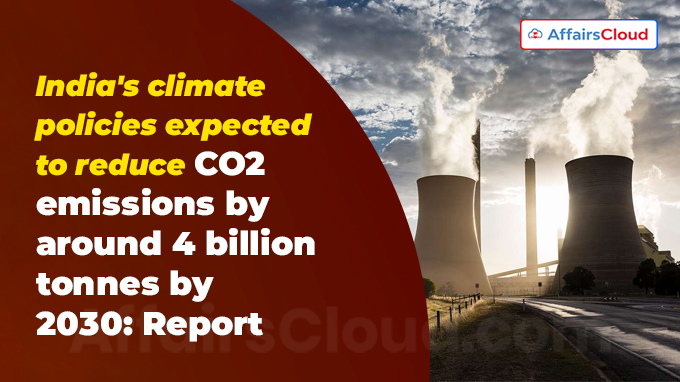 According to the New Delhi (Delhi)-based independent climate think tank, Council on Energy, Environment and Water (CEEW)’s latest report, India’s current climate policies are expected to reduce carbon dioxide (CO2) emissions by around 4 billion tonnes between 2020 and 2030.
According to the New Delhi (Delhi)-based independent climate think tank, Council on Energy, Environment and Water (CEEW)’s latest report, India’s current climate policies are expected to reduce carbon dioxide (CO2) emissions by around 4 billion tonnes between 2020 and 2030.
- This key finding of the report is important considering India, the fast-developing South Asian country, now the world’s 5th largest economy, had pledged to reducing emissions by 1 billion tonnes by 2030 at the 26th Conference of Parties (COP26) United Nations Framework Convention on Climate Change (UNFCCC) held in Glasgow, Scotland in 2021.
Key Findings:
i.The report showed that policies designed for India’s power, residential and transport sectors have already saved 440 million tonnes of carbon dioxide (MtCO2) between 2015 and 2020.
ii.As per the report, the policies promoting renewable energy only in the power sector are projected to drive a 24% decline in coal-based power generation by 2030, relative to no-policy scenario.
- This decrease will help to avoid 80 GigaWatt (GW) of coal-based power plants in India.
Note: Currently, India generates 71% of its electricity using coal.
iii.The report mentioned that with strategic support and competitive tenders, the combined contribution of solar and wind power in India’s energy mix is expected to increase to 26% by 2030 and 43% by 2050, increase from only around 3% in 2015.
- This transition will significantly reduce dependence on coal, which is currently the major source of nearly 50% of the country’s total CO2 emissions. However, India still needs more ambitious climate action plan to achieve net zero target by 2070.
Other Key Projections:
i.The report highlighted various programmes launched by the Government of India (GoI) to promote renewable energy, increased adoption of electric vehicles, like: the National Solar Mission (NSM), the Faster Adoption and Manufacturing of Hybrid and Electric Vehicles in India (FAME-I and II) schemes, the Standards and Labelling scheme and the Unnat Jyoti by Affordable LED for All (UJALA) programme.
ii.The CEEW report showed that policies in the transport sector such as FAME (2015-2022) schemes, have promoted the significant growth in the electric vehicle market.
- The report has estimated that the sales of electric two-wheelers and four-wheelers will account for 19% and 11% of their respective segments by 2030. This will result in 13% decrease in oil and gas demand this decade.
- These projections are further expected to increase significantly to above 65% for Electric Vehicle (EV) categories by 2050, which will lead to 55% reduction in oil and gas demand relative to the no-policy scenario.
iii.The report highlighted that 2006 Standards and Labelling programme in the residential sector has led to significant energy-efficiency improvements in air-conditioning.
- It has estimated that air conditioning-related electricity consumption in Indian households is expected to double between 2020 and 2030, and will further increase by almost 10 times by 2050.
iv.The GoI had disbursed over 36.7 crore energy-efficient Light Emitting Diode (LED) bulbs under UJALA programme, since 2015. The report has projected that UJALA programme is expected to reduce residential lighting electricity use by 48% by 2030 and 59% by 2050 relative to no-policy scenario.
v.The report has suggested that some immediate steps that government should include in order to accelerate its efforts to meet the 2070 net-zero target like: increasing investment in renewable energy sector, enhancing the domestic Carbon Credit Trading System (CCTS), and focusing on energy efficiency in key areas like: industry, transport, and buildings.
About Council on Energy, Environment and Water (CEEW):
Chief Executive Officer (CEO)- Arunabha Ghosh
Headquarters- New Delhi, Delhi
Established- 2010




